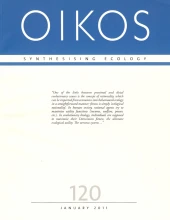In grad school, some friends and I once attended a very bad talk by a prominent ecologist. This led to a conversation over beers about whether talk quality is negatively or positively correlated with prominence of the speaker. We decided that there’s no correlation. On the one hand, prominent people become prominent by doing really good science, and really good science is essential to a really good talk. On the other hand, prominent people are busy, and their positions are secure, which might mean that they tend to put less prep work into their talks. Indeed, if you’re sufficiently prominent, giving a bad talk comes to be viewed almost as a sort of amusing eccentricity. Bill Hamilton’s talks are fondly remembered for how poor they were (I’m told he would just read his papers, in a quiet mumble). But if you’re just Joe Schmoe, no one is going to fondly remember you if you give a bad talk.
Which leads to the broader question, are there any reliable predictors of talk quality? If there were, it would be useful because it would make planning your week at the Ecological Society of America Annual Meeting much easier. Obviously, one reliable predictor of talk quality is the quality of the speaker’s past talks. But what if you don’t know anything about the speaker’s past talks, for instance because you want to take in talks on some unfamiliar subject rather than go see people you’ve heard before? Personally, when faced with this problem I either go to see people whom I’ve heard of, on the ‘I should hear this person at least once in my life’ theory, or people whose titles or abstracts sound really interesting. But what do you go on?
In the comments, please don’t name anyone who you think gives a bad talk.


Other possible predictors:
-the talk is in a symposium with other talks that you know will be good
-the speaker is a student or postdoc of someone who you know gives good talks
-the speaker is someone junior (so still needs to impress people), and has published really good papers (so does good science)
-the room in which the talk is being held is packed
By: oikosjeremy on May 22, 2011
at 7:02 pm
When I’m giving a talk, and I look around to make eye contact, and lots of eyes are looking at iphones, I know I am giving a bad talk…So lots of people not staring at the ground is a good sign in my experience.
By: schamber on May 23, 2011
at 7:14 pm
The only difficulty with this ‘predictor’ is that you can only use it after the talk has started…
By: oikosjeremy on May 23, 2011
at 7:18 pm
Right. Perhaps ESA can host a site for the upcoming conference in August in which you can text/tweet a score for a talk just after the talk is over. Limited time per person goes in, and scores can be summarized. Over time you can use scores as a predictor of what talks to go to in future conferences based on previous ratings…
By: schamber on May 23, 2011
at 7:22 pm
Heh–sounds a bit like ratemyprofessor.com. Ratethespeaker.com? All sorts of amusing possibilities for gaming the system (and practical jokes!) immediately suggest themselves, especially if talks can be scored anonymously. Whether such possibilities are bugs or features is perhaps debatable… 😉
By: oikosjeremy on May 23, 2011
at 7:40 pm
Word of mouth is usually pretty good. Also, do you know if the person has any formal training – either a background in public speaking or theater, or their graduate program or lab has an emphasis on communication. But that requires a little more knowledge on your part. As a side-note, I’ve been collaborating with a playwright and an acting teacher on working on basic public speakings trips, tricks, and exercises for scientists. What’s been fascinating is watching how different disciplinary crowds and different levels of scientists react to the workshop. Senior big name theoretical physicists all but rolling their eyes and poh-pohing the workshop while in it (lots of eye rolling and derision – classy, guys), while young ecologists just drank it up.
By: jebyrnes on May 23, 2011
at 7:26 pm
At Williams where I was an undergrad, there’s a math prof who was previously a stand-up comic. He gives lectures as an alter ego (‘Mel Slugbate, insurance salesman’), complete with costume. He’s won national teaching awards. So yes, if you’re aware of it, I think knowledge of the speaker’s public speaking or theater training would be a good predictor.
FWIW, I tried out for my college’s improv comedy group four times. I was cut every time. Make of that what you will.
By: oikosjeremy on May 23, 2011
at 7:34 pm
[…] • Oikos. This is an ecology journal with a new blog to which my friend Jeremy Fox is a primary contributor. Many of his posts are fairly ecology-specific, but some are remarks applicable to science in general. […]
By: Other recommended blogs « My Track Record on June 26, 2011
at 5:09 pm
[…] which talks to attend is always tricky at a big meeting. Which raises the question: Are there any reliable predictors of talk quality? (besides “Jeremy Fox recommended this […]
By: Advice from the archives: preparing to present at, and attend, the big summer conferences « Oikos Blog on June 5, 2012
at 11:32 pm
[…] conferences like the ESA Annual Meeting. This is something we’ve talked about on this blog before, but no one ever brought up Joan’s excellent suggestion: have a focus. That is, try to see as […]
By: How to attend big conferences: have a focus « Oikos Blog on June 12, 2012
at 5:15 pm